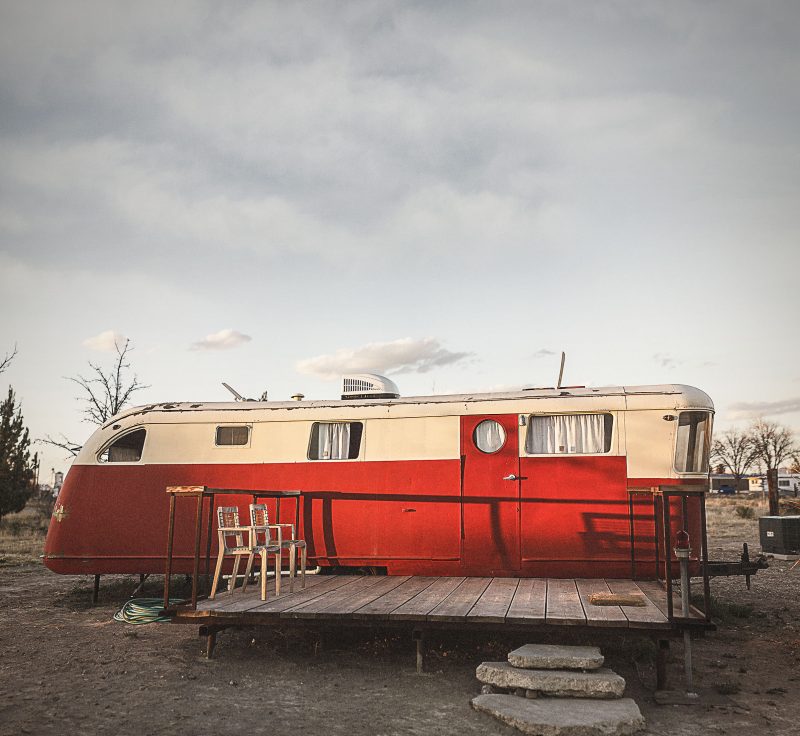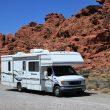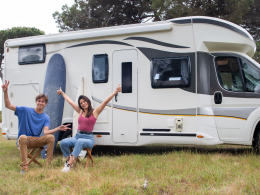The road may go on forever, but chances are, you won’t be rolling down the highway for the rest of your days.
Whether voluntary or forced, financial or based on preference, the move back to non-RV life can be tough. Let’s look at how you can make an RV exit plan.

What’s an RV Exit Plan?
An RV exit plan is your strategy for winding down your full-time RV living and switching back to a more typical lifestyle. It’s a big transition for many RVers and can introduce unexpected issues. However, an exit plan helps you make financial and other adjustments. While flexibility is important, an exit plan will help keep you on track as you navigate this massive life change.
Why Would You Need an Exit Plan?
From a change in preferences to serious health or financial issues, there are plenty of reasons why you might need an exit plan. Here are some of the most common.
Financial Reasons
Unfortunately, money can be a big reason why RVers need to leave the road and return to “normal” life. Some folks may lose a remote job, while others may face unexpected expenses that drain their savings. The sudden inability to fund a full-time RV lifestyle can throw a major wrench in your plans.
You Get Tired of the Lifestyle
Full-time RVing isn’t for everyone. Alongside the amazing people, scenery, and experiences, there are also breakdowns, traffic, bad weather, and unsavory RV parks. Even those who enjoy it may find themselves run down, tired of traveling, and aching for some extra space. There’s no shame in going back to a traditional lifestyle, but you’ll still need a plan to make the transition.
Community Health Concerns
COVID-19 changed the game when it came to full-time traveling. Suddenly, living in 300 square feet felt less attractive. All the attractions you came to visit, museums you hoped to see, and restaurants you wanted to eat at were closed or restricted. And then, there are the health risks that many face if infected with the coronavirus. Community health concerns can significantly impact your life plan. And while COVID-19 may be top of mind now, there’s no reason future health issues couldn’t be as bad or worse, making this an important consideration.
Problems with RV Parks
Dealing with RV parks is often a less-than-smooth process. When you rely on parks for a place to stay, it can get exhausting. Unexpected costs, unpleasant neighbors, or crowded amenities have become more common as RVing has boomed in recent years. Dealing with these issues for months or years at a time can be enough to have just about anyone longing for the privacy and stability of a typical home.
Overcrowding
Even the most spacious motorhomes and fifth wheels still pale in comparison to the size of the most modest homes. Life changes like a new child or pet may leave you feeling a little cramped. You might simply be tired of dealing with the storage, cooking, and other headaches that come from living in a small space. An exit plan will help you manage this and give you a bit more breathing space.
Injury or Death
It’s something no one wants to think about, but things happen. Do you know what your plan would be if you or a loved one were seriously hurt or killed? You may no longer be able to physically travel full-time in your RV. While healing or grieving is the most important thing following a serious incident, you also may face the choice of whether to wind down your RV lifestyle. Having a plan in place ensures these difficult times are as straightforward as possible.
When Should You Develop Your Exit Plan?
You should develop your exit plan as soon as possible — ideally, before hitting the road or even before purchasing your RV. For most people, RVs are a massive purchase. You can feel more confident knowing your plans for the future of this expensive but depreciating asset. Knowing your exit plan and the circumstances that might trigger it can help shape your travel and lifestyle choices. You don’t need to hammer out all the details immediately. Simply keeping the concept in mind can make things a lot easier.
Things to Think About in Your RV Exit Plan
So what are the main aspects of an RV exit plan? These are the most important things you need to decide.
When You’ll Stop
You don’t need to know down to the day, month, or even year. Still, having a general idea helps give you a head start on taking care of other significant hurdles that follow the decision to exit RV life. “When” can also be an event or set of circumstances that trigger your exit, rather than a specific date or date range.
Where You’ll Live
Having a place to stay is one of the most crucial elements of your RV exit plan. Most folks who live full-time in their RV aren’t holding onto an apartment or house to go back to. That means you’ll most likely need a new place to live. Perhaps you’ll just plan on the city or region where you want to live. You can also pick out a specific house or neighborhood where you’d go if you had to. Your plan can also include temporary stays with family or friends, short-term rentals, or Airbnbs.
What You’ll Do for Work
For those who’ve been working full-time remote jobs while on the road, little may change on this front. However, those who’ve either taken time off to travel or worked a mobile job at locations on the road will need to figure out their finances. This decision can impact your decision about where you’ll live, based on both your proximity to jobs and the wages you can earn.
How Your Family and Friends Fit In
Your family and friends can play a crucial role in your exit plan. They may be able to provide a place to stay while you figure out a permanent housing solution. They could have connections to housing, jobs, and other resources. No one likes a moocher, but help during difficult transitions like these is one of the reasons friendships and family connections can be so meaningful.
What You’ll Do with Your RV
It’s been your home for a while now, but what’s next for your trusty RV? Your exit plan should spell out whether you’re interested in keeping it and under what circumstances. It’s also crucial to plan for situations where you may sell your RV, either because of financial considerations or a living situation that doesn’t allow you to keep it. Again, this can be as simple or as general as you like, from “keep it in my driveway” to lists of specific dealers.
After You Exit Can You Come Back?
You can always head back out on the road if you’ve kept your rig or purchase a new one if you sold it. Nevertheless, it’s essential to keep in mind that these transitions can be difficult both ways. You’d have to undo your RV exit plan, only to potentially redo it all again. Still, while it might be tricky and expensive, there’s no reason why a determined former RVer can’t return to full-time RV life. Do you have an RV exit plan yet?
If You Want the Latest Travel News, Join Our Mailing List
Don’t rely on biased RV industry news sources to keep you informed. Stick with Nomadic News. We publish articles and breaking stories that matter to you every weekday.










